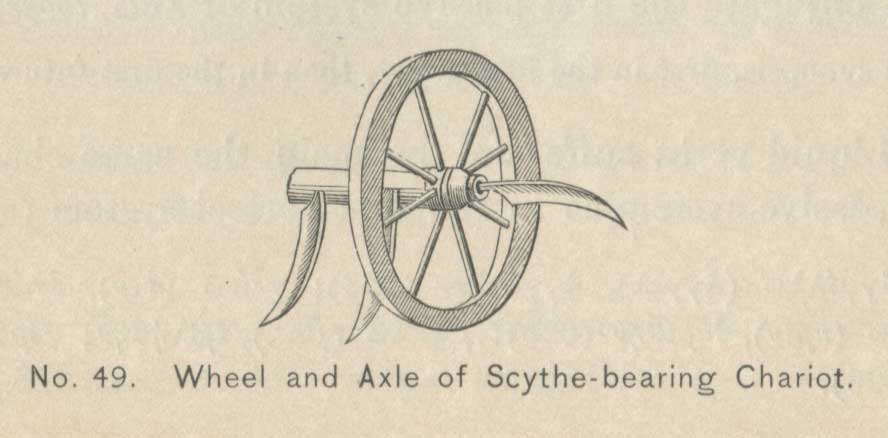THE FIRST GREEK BOOK
BY JOHN WILLIAMS WHITE, PH.D, LL.D., LITT.D.
Professor Of Ancient Greek At Harvard University
This Revision Copyright ©2012 by Shawn Irwin
Lesson LXX - Perfect Middle System of Liquid Verbs
S648. Liquid verbs suffer in the main the same changes in the perfect
middle system as in the first perfect system (623-626).
Thus, ἀγγέλλω (ἀγγελ), ἤγγελμαι (623); στέλλω (στελ), ἔσταλμαι;
φθείρω (φθερ), ἔφθαρμαι (624); κρίνω (κριν), κέκριμαι; τείνω (τεν),
τέταμαι (625); βάλλω (βαλ), βέβλημαι; τέμνω (τεμ), τέτμημαι (626).
S649. Conjugate the perfect middle systems of στέλλω
and φαίνω in 778 and 779.
Give their synopses.
S650. If ν is not dropped (625), it is changed to σ before
μ, as φαινω (φαν), πεφασμαι.
S651. In the inflection, σ between two consonants is dropped.
S652. VOCABULARY
ἀποστέλλω, send away, despatch.
διὰσπείρω, scatter about, scatter.
θαρρέω, θαρρήσω, ἐθάρρησα, τεθάρρηκα, be bold or courageous.
οἰωνός, οῦ, ὁ, omen.
οὐδαμοῦ, (compare οὐ), adverb, nowhere.
ὀφθαλμός, οῦ, ὁ, (compare ὄψομαι), eye.
παραγγέλλω, pass along an order, give orders, order.
σπείρω (σπερ), σπερῶ, ἔσπειρα, ἔσπαρμαι, ἐσπάρην, sow, throw about, scatter, disperse.
σφόδρα, adverb, exceedingly.
σωτηρίᾱ, ας, ἡ, (compare σωτήρ), safety, deliverance.
ταράττω (ταραχ), ταράξω, ἐτἅραξα τετάραγμαι, ἐταράχθην, trouble, disturb, agitate.
S653.
1. θαυμάζω ὅτι οὐδαμοῦ Κῦρος πέφανται.
2. παρήγγελτο δὲ τοῖς ἱππεῦσι θαρροῦσι διώκειν.
παρήγγελτο, orders had been given, The subject is the following infinitive. Cf. 461, 4 and 5.
θαρροῦσι courageously: The participle (in the dative plural) express manner (495,3).
3. καὶ ταῦτα ἀκούσας ἐταράχθη σφόδρα καὶ ἠρώτησεν εἰ ἤδη ἀποκεκριμένοι εἶεν.
εἶεν For the optative, see 569. Give the question in its original form.
4. οἱ δ᾽ ἱππεῖς ἐσπαρμένοι εἰσίν.
5. συνηγμένοι ἦσαν τῶν διεσπαρμένων οἰ πλεῖστοι.
6. Κλέαρχος δὲ τοῖς ἄλλοις ἡγεῖτο κατὰ τὰ παρηγγελμένα, οἰ δ᾽ εἵποντο.
παρηγγελμένα, i.e., according to orders, literally according to the orders that had been given.
7. ἀπεσταλμένοι εἰσιν οἱ ἄγγελοι καὶ σὺν αὐτοῖς στρατηγός τις ἀγαθός.
8. ἐλείποντο δὲ τῶν στρατιωτῶν οἰ διεφθαρμένοι ὑπο τῆς χιόνος
τοὺς ὀφθαλμούς.
οἰ διεφθαρμένοι τοὺς ὀφθαλμούς, those who (literally had been injured) had
had their eyes blinded, The active construction would be ἡ χιων διαφθειρει τινι (861) τοὺς ὀφθαλμους, In the
passive the dative becomes the subject and the accusative remains. Cf. 616, 5, and the note.
9. τοὺς δὲ Κρῆτας ἔφη ἀπεστάλθαι.
10. περὶ σωτηρίᾱs ἡμῖν θῡομένοις οἰωνὸς τοῦ Διὸς τοῦ σωτῆρος πέφανται.
S654.
1. Boats had already been dispatched to the army by Cyrus.
2. But the cavalry have been dispersed.
3. The army has been corrupted.
4. None have appeared (who are) able to help us.
5. Orders had been given the peltasts to follow.

S655. Cyrus advances with Less Caution.
ἐπεὶ δ᾽ ἐπὶ τῇ τάφρῳ οὐκ ἐκώλῡε βασιλεύς τό Κύρου στράτευμα
διαβαίνειν, ἔδοξε καὶ Κύρῳ καὶ τοῖς ἄλλοις οὐ μέλλειν μαχεῖσθαι.
ὥστε τῇ ὑστεραίᾳ Κῦρος ἐπορεύετο ἠμελημένως μάλλον. τῇ δὲ
τρίτῃ ἐπὶ τε τοῦ ἅρματος καθήμενος τὴν πορείᾱν ἐποιεῖτο καὶ
ὀλίγους ἐν τάξει ἔχων πρὸ αὐτοῦ, τὸ δὲ πολὺ αὐτῷ
ἀνατεταραγμένον ἐπορεύετο καὶ τῶν ὄπλων τοῖς στρατιώταις πολλὰ
ἐπὶ ἀμαξῶν ἤγετο καὶ ὑποζυγίων.
ἐκώλῡε: imperfect of attempted action.
ἔδοξε: personal construction, the subject being a pronoun referring to βασιλεύς.
καθήμενος: sitting, participle of the verb κάθημαι, sit. Both καθήμενος, and ἔχων
are participles of manner (495, 3 ).
αὐτῷ: dative of disadvantage (861), στρατιώταις in the next line, is a dative of advantage.
See the route on the map.
End Of Chapter
INDEX
Chapter 71
HOME
This Revision Copyright ©2012 by Shawn Irwin
